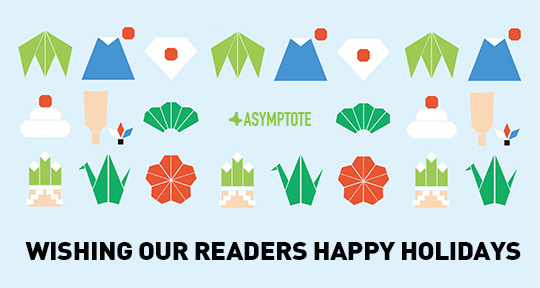Asymptote celebrates its ninth anniversary with the Winter 2020 issue, featuring new work from thirty-one countries and twenty-two languages (including three new ones: Kurmanci, Old Scots, and Serbo-Croatian)! To help you navigate through such an abundance, our blog editors reveal their favorite pieces below:
Each issue of Asymptote brings with it a utopian vision—that many nations (thirty-one, in this case) may share a page, with each literature distinct but gathered in communion, resulting in a chorus that somehow does not subjugate any single voice. As always, I am astounded by the way one is allowed to travel along the cartography of these collected texts, and how vividly they summon the worlds available in their language.
For a while now I’ve been entertaining the thought that the first step to harnessing language (if there is such a thing) is to distrust it, and so was stopped short by the first line of Eduardo Lalo’s “Unbelieve/Unwrite”:
Unbelieve. Unbelieving the world means questioning the structures that sustain it.
And a couple lines on:
Unbelieving so that writing will wash ashore, like a gift.
These writings are the result of a great loss that causes one to take solace in nothingness, and seems particularly resonant today in the age in which traditional anchors—nationality, religion, family, certainty in our survival as a species—are quickly being drained of their staying power. Arriving in the aftermath of Puerto Rico’s devastation, Lalo seeks to dismantle our reliance on infrastructures both physical and psychological, while simultaneously being brilliantly aware of life’s unassailable fullness. Lalo continuously returns to the art of writing as a source of stability and control, and in doing so affirms the act of writing as a way of approaching the world, absolving the art of its mystery but instilling it with conviction. It is bleak and somehow victorious. READ MORE…








